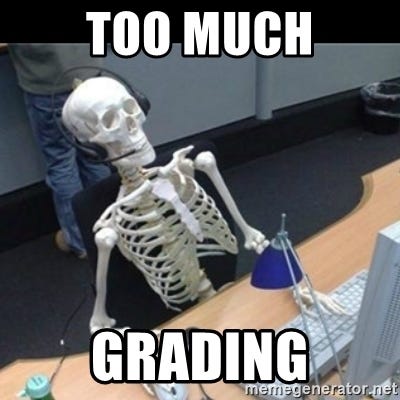Tip: Wrapping up the Semester
Triage Time. Concentrate all your efforts on work where immediate care will make a positive difference.
It’s the most wonderful time of the year! For us college & university instructors anyway…the countdown to summer break. No matter how much we may love teaching, it’s been a long year. A very, very long year. In normal times this is an extra stressful time of the semester: students suddenly realizing that final grades are coming, committees trying to wrap up all their work by May 15th (which we all know won’t happen), and all the grading.
At this point, decisions for the semester are not really about making thorough plans, they are about salvaging the last few weeks and just getting through. It’s like academic triage (although luckily much less serious than real triage situations). Historically, triage separated wounded into three categories
Those who are likely to survive, regardless of what care they receive.
Those who are unlikely to survive, regardless of what care they receive;
Those for whom immediate care may make a positive difference in outcome.
To be clear, I am not talking about students or their grades here; I am talking about what actions you can take to triage your own work. What bandwidth do you have at this point to contribute to college governance? That might be an area that you decide is likely to survive and so you can take a step back for the next couple of weeks. Are you on a hiring committee for the fall? That’s certainly an area where immediate care may make a positive difference and you would need to put in the necessary level of care. Is there a policy or initiative that you have been pushing for and keep coming up against a dead-end each time? It might be time to admit that this is something that is unlikely to survive. Whatever this is for you, step away from it without any guilt. It’s time to concentrate all your efforts on work, like grading assignments and providing targeted feedback, where immediate care will make a positive difference.
Your “immediate care” list might still be quite long.
Here are some places to really focus your energy, and some suggestions for how to do so most effectively.
To save time on providing feedback on last-minute assignments, think about asking students what they want: a grade and feedback or just the grade. I’ll be honest, I’ve never done this, but it gets a the core issue pretty neatly - only offer feedback to students who really want it.
Another alternative is to require students to address your feedback and offer points for improvement. Either way, your feedback is more likely to be attended to, and that in itself makes grading final papers less draining.
Another frequent end-of-semester issue grade changes or extra credit requests - here’s where a set procedure for how to address these requests can be helpful. If students want to argue for a better grade on a test or assignment, this grade review policy asks students to do additional critical thinking about their response and present evidence that justifies a higher score.
‘Tis also the season for last-minute letters of recommendation! Although most students aiming for grad school completed their applications months ago, there are still scholarships, internships, or other summer programs they might be eyeing. Make the process easier with some scripts for students and instructors.
Self-care: I almost hate writing those words at this point.
It doesn’t feel like self-care anymore to take a walk, listen to a podcast, or take a screen break; it feels like something else for which I don’t really have time. Which probably means it’s more important than ever to set boundaries and acknowledge the emotional labor of supporting struggling students, if only so that “self-care” doesn’t come in the form of too many cookies while grading.
When you’re feeling down and overwhelmed is a good time to send out your end-of-semester surveys. Hear me out, I don’t mean the institution course evaluations - those are, nearly always, rubbish. No, my surveys ask students much more helpful questions about class materials, activities, communication, what they wish I knew about them, what they wish they had done differently, what they did well, and what advice they would give to a student in the course next fall. I get my share of disappointed students, but there are always gems of wisdom and gratitude in these surveys, too. And isn’t that a kernel of truth about teaching? You sometimes have to dig deep for the gems, but when you find them, they make the whole process worthwhile.



